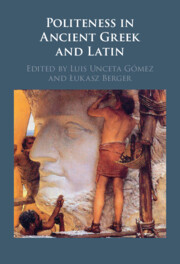Book contents
- Politeness in Ancient Greek and Latin
- Politeness in Ancient Greek and Latin
- Copyright page
- Contents
- Figures and Tables
- Contributors
- Preface
- Abbreviations
- Part I Introduction
- Part II The Expression of Im/Politeness
- Part III Im/Politeness in Use
- Chapter 6 Friendship Terms in Plato
- Chapter 7 Conversational Openings and Politeness in Menander
- Chapter 8 Im/Politeness of Interruptions in Roman Comedy
- Chapter 9 Im/Politeness and Conversation Analysis in Greek Tragedy
- Chapter 10 Qui Honoris Causa Nominatur
- Chapter 11 Banter, Teasing and Politeness in Varro’s De Re Rustica
- Part IV Ancient Perceptions on Im/Politeness
- Glossary
- References
- Index Rerum
- Index Locorum
Chapter 9 - Im/Politeness and Conversation Analysis in Greek Tragedy
The Case of Theseus and the Herald in Euripides’ Supplices
from Part III - Im/Politeness in Use
Published online by Cambridge University Press: 08 September 2022
- Politeness in Ancient Greek and Latin
- Politeness in Ancient Greek and Latin
- Copyright page
- Contents
- Figures and Tables
- Contributors
- Preface
- Abbreviations
- Part I Introduction
- Part II The Expression of Im/Politeness
- Part III Im/Politeness in Use
- Chapter 6 Friendship Terms in Plato
- Chapter 7 Conversational Openings and Politeness in Menander
- Chapter 8 Im/Politeness of Interruptions in Roman Comedy
- Chapter 9 Im/Politeness and Conversation Analysis in Greek Tragedy
- Chapter 10 Qui Honoris Causa Nominatur
- Chapter 11 Banter, Teasing and Politeness in Varro’s De Re Rustica
- Part IV Ancient Perceptions on Im/Politeness
- Glossary
- References
- Index Rerum
- Index Locorum
Summary
This chapter has two core aims: first, it argues that a ‘discursive’ approach to im/politeness, which foregrounds interactants’ own (emic) evaluations of the (in)appropriateness of language as they arise in discourse, is needed to properly capture the nuances of social interaction in Greek and Roman literature. Second, it seeks to demonstrate the utility of Conversation Analysis in approaching this emic perspective. The chapter sets out from various passages in Greek tragedy in which speakers explicitly comment on the inappropriateness of their interlocutors’ language (metapragmatic comments), and shows that such comments regularly coincide with disruptions of regular conversational sequencing. The chapter then offers an extensive analysis of the herald scene in Euripides’ Supplices, a passage rich in metapragmatic commentary. Theseus’ principal concern in that scene, it is argued, is the correct procedural conduct of inter-polis diplomacy, rather than any putative personal face wants. Accordingly, expressions traditionally interpreted as politeness formulae should in this scene be seen as procedural rather than face-oriented devices.
Keywords
- Type
- Chapter
- Information
- Politeness in Ancient Greek and Latin , pp. 227 - 248Publisher: Cambridge University PressPrint publication year: 2022

